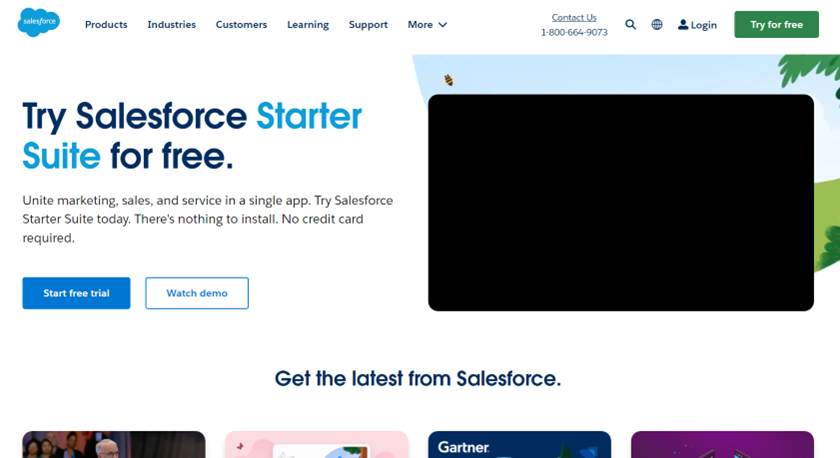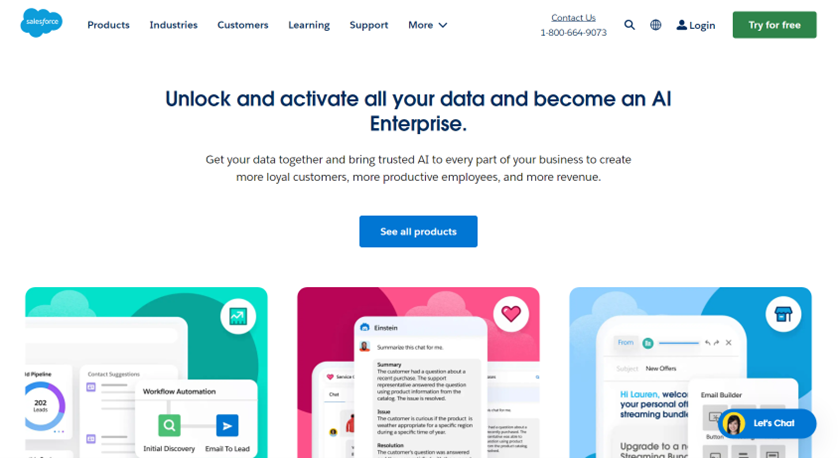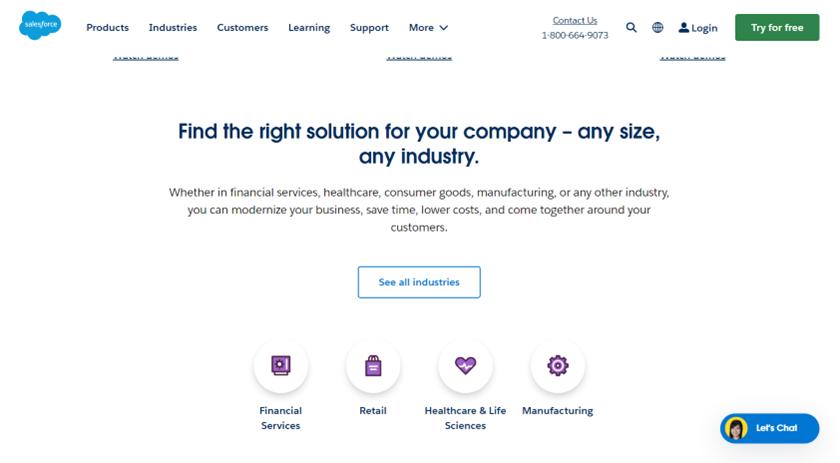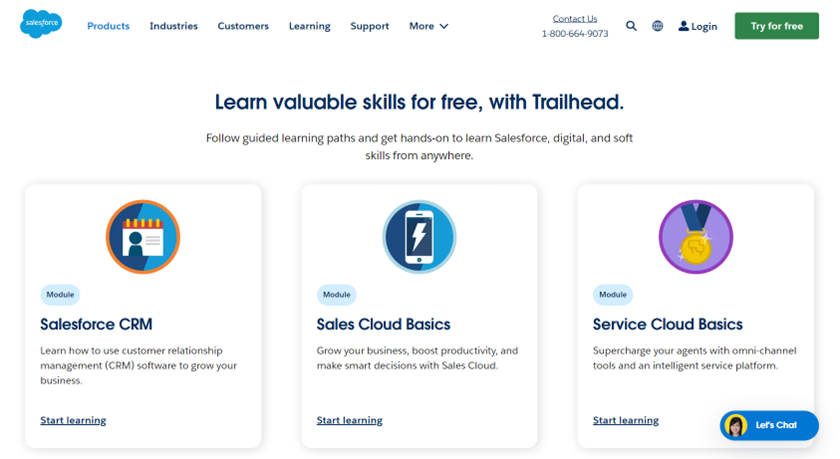Salesforce Marketing Cloud Lead Management Review: Our Verdict

Salesforce Marketing Cloud Lead Management excels at automating lead tracking, enhancing personalization, and improving collaboration between marketing and sales teams. It optimizes lead-to-opportunity conversion rates and provides valuable insights for decision-making.
However, it is costly, complex to set up, and has a steep learning curve, making it challenging for you as a small business owner or if you have limited technical resources. Its performance issues and maintenance requirements can also be drawbacks.
Despite its challenges, its robust features make it a powerful tool for your business, if you are looking to manage and convert leads effectively.
- Automates lead tracking, ensuring no potential opportunities slip through the cracks.
- Enhances personalization using unique communication to individual leads.
- Streamlines collaboration between marketing and sales teams.
- Optimizes lead-to-opportunity conversion rates.
- Provides actionable insights for better decision-making.
- Involves configuring and setting up Salesforce Marketing Cloud, which is complex and time-consuming.
- Proves to be expensive, particularly for smaller businesses or startups.
- Requires users to invest time in understanding the features and functionalities, often resulting in a steep learning curve.
- Has issues when integrating Salesforce Marketing Cloud with existing systems, causing compatibility issues.
- Necessitates regular maintenance, updates, and monitoring, leading to an overhead.
1. Salesforce Marketing Cloud Lead Management Review: Who Salesforce Marketing Cloud Lead Management Is Best For

Salesforce Marketing Cloud Lead Management is ideal for you if you:
- Want to manage your leads effectively throughout the lifecycle, whether you’re a sales professional or a marketer.
- Desire to collaborate across different teams easily with the tools Salesforce Marketing Cloud provides.
- Seek customization and want to tailor your interactions with your leads based on individual preferences for personalized communication.
- Value data-driven insights using relevant and actionable insights from Salesforce Marketing Cloud for data-driven decision-making.
2. Salesforce Marketing Cloud Lead Management Review: Who Salesforce Marketing Cloud Lead Management Is Not Right For
Salesforce Marketing Cloud Lead Management is not the right fit for you if you:
- Want limited lead interaction because you rarely deal with leads and rely primarily on existing customer relationships, which makes the full suite of lead management features unnecessary.
- Face budget constraints as a small business owner with tight budgets and find Salesforce Marketing Cloud’s cost a hindrance, making more affordable alternatives a better choice.
- Desire a straightforward marketing process that doesn’t involve multiple stages or complex lead nurturing.
- Lack the technical resources to implement and maintain Salesforce Marketing Cloud. If your team lacks the necessary skills, consider other options.
3. Salesforce Marketing Cloud Lead Management Review: What Salesforce Marketing Cloud Lead Management Offers

Salesforce Data Cloud: You can customize content, suggestions, and experiences when you get data from multiple sources. To maintain and strengthen client relationships, you have access to real-time data that facilitates proactive service interactions and upsell opportunities.
Salesforce Marketing Cloud Intelligence: It provides you with data-driven insights to help you optimize performance. It incorporates performance data, automates reporting, and identifies enhancement opportunities using AI. Its analytic tools merge marketing and business data, enhancing your campaign efficiency and ROI.
Salesforce Marketing Cloud Engagement: It empowers your business with AI-powered tools to build personalized campaigns and enhance your customer relationships at different levels. It integrates email, SMS, mobile app engagement, and conversational messaging.
Salesforce Marketing Cloud Account Engagement: It offers B2B marketing automation tools to grow revenue and enhance customer engagement with AI-driven solutions. You can create individual journeys, score leads with AI, and align sales and marketing teams efficiently. Pricing tiers range from $1,250 to $15,000 per month, offering automation and analytics capabilities across various levels.
Salesforce Loyalty Management: It cultivates customer loyalty through unique rewards and industry templates that you feed directly into CRM. It supports multiple programs across brands, leveraging AI for customer engagement and Referral Marketing.
Salesforce Marketing Cloud Growth Edition: It empowers small businesses with AI-driven marketing automation. It facilitates effective customer engagement through personal and diverse journeys and improves your sales notifications. It facilitates quicker customer outreach.
4. Salesforce Marketing Cloud Lead Management Review: Salesforce Marketing Cloud Lead Management Details
- Marketing Cloud Engagement
- $1,250 per month
- Email marketing, Content Development, and Robust Analytics
- Marketing Cloud Account Engagement
- $1,250 per month
- Dashboards for engagement history, lead nurturing and scoring, campaign reporting, and insights
- Marketing Cloud Growth Edition
- $1,500 per month
- Multi-channel journeys, Forms and Landing pages, and Emails and Campaigns using AI
- Data Cloud for Marketing
- $108,000 per year
- Identity resolution and activation, data ingestion and harmonization, insights and predictions
- Marketing Cloud Personalization
- $108,000 per year
- Segmentation, Rule-Based Decisioning, A/B/N Testing and Reporting, Personalization for Email and the Web, and Product and Content Recommendations
- Marketing Cloud Intelligence
- $3,000 per month
- Advanced Analytics and Insights, 3 Million Data Rows, 10 Users
- Loyalty Management
- $20,000 per month
- Tableau CRM for Loyalty Management Base App, Member Administration, Reward Management, and Static Benefit Management
- Referral Marketing
- $12,500 per month
- Refer-a-Friend Template, Voucher Management, Referral Tracking, 100,000 Brand Advocates, and Unlimited Referral Promotions
5. Salesforce Marketing Cloud Lead Management Review: Where Salesforce Marketing Cloud Lead Management Stands Out

Lead Generation: Salesforce Marketing Cloud helps your business generate leads through various channels such as social media, email campaigns, web forms, and landing pages. It captures potential customer information and organizes it for further processing.
Lead Qualification: Salesforce Marketing Cloud allows your business to qualify leads based on criteria like demographics, behavior, and engagement. You can score leads to prioritize your follow-up efforts.
Lead Nurturing: Salesforce enables you to engage potential customers with unique communication through targeted emails, webinars, and content. This approach keeps potential buyers active until the time comes to make a purchase.
Sales Handover: Salesforce ensures a smooth handover to your sales team. It provides the necessary context and information for a smooth transition.
Collaboration Between Teams: Salesforce Marketing Cloud bridges the gap between your marketing and sales teams, building collaboration. Both teams work together to maximize lead conversion.
Automation and Workflows: Salesforce streamlines your lead management processes with automation features. It automatically triggers actions based on your leads’ behavior, ensuring you carry out timely follow-ups.
Analytics and Reporting: Salesforce provides you with insights into lead performance, campaign effectiveness, and conversion rates through analytics and reporting. When you make decisions based on data, it leads to better outcomes.
6. Salesforce Marketing Cloud Lead Management Review: Where Salesforce Marketing Cloud Lead Management Falls Short
Cost: Salesforce Marketing Cloud can impose high expenses, particularly if you run a small business. You might find the monthly or yearly subscription fees challenging or expensive.
Learning Curve: It requires considerable time and effort to master all its features due to its complexity. You need to invest in training and onboarding to become proficient.
Resource Intensive: Using Salesforce effectively demands a significant amount of your time and energy for implementation, training, configuration, and ongoing management. You need to allocate adequate resources to these tasks.
Performance Issues: Some users complain of occasional slowness and unresponsiveness in its software. This makes it hard to ensure optimal performance all the time.
7. Salesforce Marketing Cloud Lead Management Review: How to Start Using Salesforce Marketing Cloud Lead Management

To start using Salesforce Marketing Cloud Lead Management software, you need to sign up, then:
Align Sales and Marketing Teams: Agree on definitions and establish a unified process for managing the sales funnel, ensuring clear expectations before transferring responsibilities.
Use Marketing Automation Effectively: Integrate CRM with marketing automation to streamline operations, engage better leads, and reduce repetitive tasks for sales reps.
Activate Lead Intelligence View: Enable Lead Intelligence View in Salesforce Setup and consider using Einstein Activity Capture and Activity Metrics for enhanced insights.
Customize Lead Fields: Create custom lead fields tailored to your company and map to ensure data consistency across account, contact, and opportunity fields.
Set Default Lead Status: Choose the default status for new and converted leads in the Lead Status picklist, utilizing Preserve Lead Status to maintain consistency across ownership changes.
Configure Lead Assignment Rules: Set up automated lead assignment rules based on criteria such as geography and product interest to streamline distribution.
Capture Leads from Website and LinkedIn: Automatically capture leads from your website using Web-to-Lead and integrate with LinkedIn Lead Gen ads for seamless lead acquisition, if applicable.
8. Salesforce Marketing Cloud Lead Management Review: Alternatives to Salesforce Marketing Cloud Lead Management
- HubSpot: is an all-in-one customer platform that integrates marketing, sales, and customer service tools. It helps your business grow through its focus on customer relationships. With features like lead capture, nurturing, CRM integration, and analytics, HubSpot streamlines your lead management.
- SugarCRM: offers lead management software that helps you identify and track your hottest leads from multiple campaigns. You can segment leads based on industry, source, and geography. It allows you to convert qualified leads to opportunities quickly and optimize the sales funnel through routing potential customers to the correct salesperson. It also automates the lead hand-off process between marketing and sales.
- Freshworks CRM: Freshworks provides a comprehensive lead management solution through its CRM platform, Freshsales. It helps your business attract, capture, and guide potential buyers through the sales funnel until the point of becoming paying customers. With Freshsales, you can capture high-quality leads, prioritize customers using AI-based scoring, and enhance collaboration within your CRM system to close deals more efficiently.
- ActiveCampaign is a powerful platform for lead management. It helps your business prioritize and manage leads effectively. With features like lead scoring, it assigns scores based on lead behavior, engagement, and interactions. It enables your sales and marketing teams to focus on the most promising prospects.
9. Salesforce Marketing Cloud Lead Management Review: Customer Reviews
According to Trustpilot, Salesforce receives diverse reviews from customers. Its overall rating is 1.2 out of 5 stars, with most of its reviews being negative. Users express frustration with poor customer service, unhelpful representatives, and constant changes in account managers. Additionally, some complain about high costs and difficulties in getting revisions during renewal.
HubSpot CRM Lead Management Review: Customer Reviews
Set Clear Objectives: Define your goals for using lead management software. Whether it’s increasing lead conversion rates or improving lead nurturing, having clear objectives guides your strategy.
Optimize Lead Capture Forms: Simplify your lead capture form to ensure it is user-friendly. Only ask for essential information to reduce abandonment rates and increase the number of leads.
Leverage Automation: Utilize automation features to streamline repetitive tasks such as follow-up emails and lead scoring. This saves time and ensures consistent communication with leads.
Segment Your Leads: Categorize your leads based on criteria like behavior, demographics, and engagement levels. This allows for more targeted and personalized communication, improving conversion rates.
Implement Lead Scoring: Use lead scoring to prioritize leads based on the likelihood to convert. This helps your sales team focus more efforts on the most promising prospects.
Integrate with CRM Systems: Ensure your lead management software is integrated with your CRM system. This provides a seamless flow of information and improves collaboration between marketing and sales teams.
Regularly Review and Clean Your Data: Maintain data hygiene, regularly reviewing and updating your lead database. Remove duplicates and outdated information to keep your data accurate and reliable.
Personalize Communication: Tailor your communication to each lead’s interests and behavior. Personalized messages resonate more with leads, increasing engagement and the likelihood of conversion.
Track and Analyze Performance: Continuously monitor the performance of your lead management efforts. Use analytics to identify what’s working and what’s not, and adjust your strategies accordingly.
Provide Training for Your Team: Invest in training for your team to ensure each member is proficient with the lead management software. A well-trained team can maximize the software’s potential and achieve better results.
Align Marketing and Sales Teams: Foster collaboration between your marketing and sales teams. Ensure both teams are aligned on definitions and processes to create a cohesive lead management strategy.
Nurture Leads Effectively: Develop a comprehensive lead nurturing strategy that includes a mix of emails, content, and touchpoints. Keep your leads engaged until ready to make a purchase.
Utilize Multi-Channel Engagement: Engage with leads across multiple channels such as email, social media, and mobile. Multi-channel engagement increases your reach and improves the chances of converting leads.
Set Up Automated Workflows: Create automated workflows for different stages of the lead journey. This ensures timely and relevant interactions with leads, enhancing experience and moving down the sales funnel.
Solicit Feedback: Gather feedback from your team and leads to understand the strengths and weaknesses of your lead management processes. Use this feedback to make continuous improvements.
Pro Tips
Salesforce Marketing Cloud Lead Management excels in automating lead tracking, enhancing personalization, and optimizing conversions, making it ideal for your business if you seek robust lead management. However, its complexity, high cost, steep learning curve, and resource demands pose challenges, especially for smaller businesses.
It offers powerful tools like Salesforce Data Cloud, Marketing Cloud Intelligence, and Marketing Cloud Engagement, but requires significant time and technical expertise. Alternatives like HubSpot, SugarCRM, and Freshworks CRM provide similar benefits with potentially lower costs and simpler setups. Despite its strengths, user reviews often highlight poor customer service and high expenses as major drawbacks.
Recap
HubSpot CRM excels in lead management with its intuitive interface and robust features, making it ideal for businesses of all sizes. It offers advanced tools for lead tracking, scoring, and nurturing, ensuring efficient management and conversion of leads. Users appreciate its seamless integration capabilities with other essential tools and platforms, which streamline workflows and enhance productivity. Despite its many strengths, some users find the customization options limited compared to other CRM solutions.













